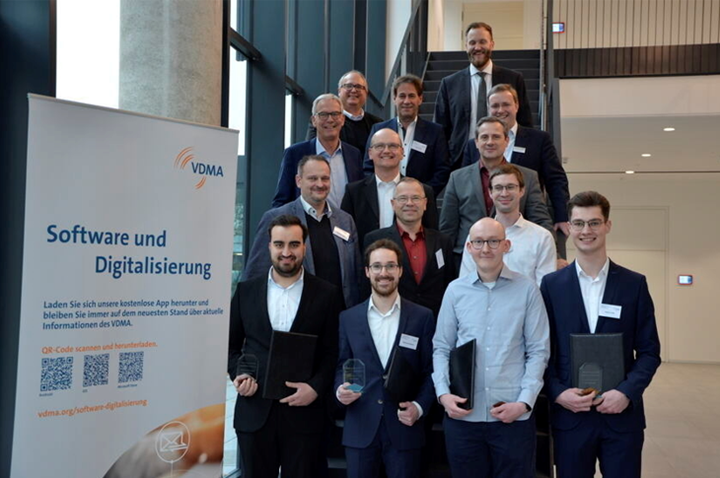ITA graduate develops AI-supported monitoring system to detect damaged carbon fiber
Deniz Sinan Yesilyurt wins a Young Talent Award from VDMA for his Bachelor’s thesis that used machine learning to recognize various fiber defects with up to 99% accuracy during thermal stabilization.

Winners of the VDMA Young Talent Award. Deniz Yesilyurt is depicted in the first row, far left. Photo Credit: VDMA
On Dec. 6, (ITA, Germany) junior engineer and Bachelor’s graduate, Deniz Sinan Yesilyurt, received the “Digitalisation in Mechanical Engineering” Young Talent Award initiated by the German Engineering Federation (VDMA) in Frankfurt am Main, Germany. He was awarded second place for his Bachelor’s thesis “Development of a Kl-supported process monitoring system using machine learning to detect fibre damage in the stabilisation process,” in which he developed an AI-based camera system to automatically detect and classify fiber defects in carbon fiber production in order to reduce production costs and increase inspection efficiency.
Carbon fiber production is considered to be a highly complex process. Thermal stabilization, for example, is a highly manual process in which up to 300 individual fiber strands (bundles of individual fibers) have to be monitored simultaneously to avoid fiber damage. Due to the size of the ovens and many fiber strands, fiber defects often cannot be identified at an early stage in industrial production, leading to fiber damage, and thus, downtime to remove the damaged fibers.
To find a solution to this, Yesilyurt considered the integration of artificial intelligence (AI) into the production process, as a means to mimic human vision by using camera systems to automatically complete predefined tasks. Yesilyurt attached a camera to the carbon fiber line that takes pictures of various fiber defects during production and collects them in a database. The AI within the camera’s information technology system is then able to evaluates any fiber defects by assigning the images to predefined reference defects. According to the engineer, the AI system is able to recognize various fiber defects with a classification accuracy of 99%. The developed process can also be used in other areas that produce chemical fibers.
This project was part of the larger Carboscreen research program reported by CW, “CarboScreen project to develop multimodal, sensor-based monitoring of carbon fiber production process.” For more information, download the thesis paper here.
The VDMA awarded the prize to a total of four theses from different universities from Germany, Austria and Switzerland.
View for the original article.
Related Content
-
Plant tour: Airbus, Illescas, Spain
Airbus’ Illescas facility, featuring highly automated composites processes for the A350 lower wing cover and one-piece Section 19 fuselage barrels, works toward production ramp-ups and next-generation aircraft.
-
The potential for thermoplastic composite nacelles
Collins Aerospace draws on global team, decades of experience to demonstrate large, curved AFP and welded structures for the next generation of aircraft.
-
Sulapac introduces Sulapac Flow 1.7 to replace PLA, ABS and PP in FDM, FGF
Available as filament and granules for extrusion, new wood composite matches properties yet is compostable, eliminates microplastics and reduces carbon footprint.






